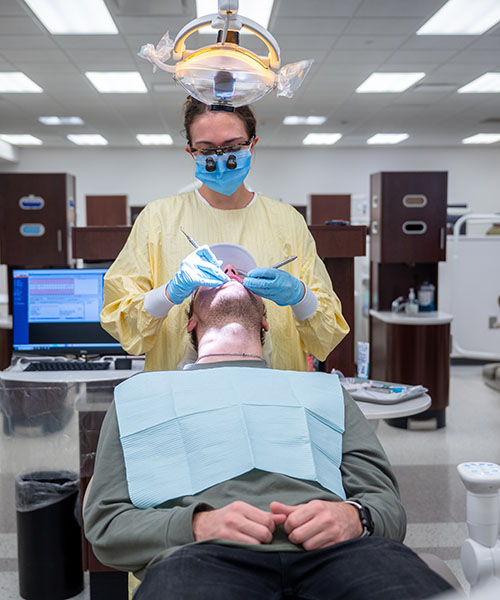Registered Dental Hygienists are credentialed and licensed health professionals who serve integral roles in the delivery of oral health care. Georgia Workforce ranked dental hygiene a field that is "fast growing, high-paying, and expected to offer plentiful job openings over the projected period."
The Augusta University Dental Hygiene program enrolled its first class in 1967, and has since maintained its accreditation status by upholding the rigorous educational standards of the profession, including the many technical standards required for success. Pass rates on national written and clinical board examinations continue to be outstanding as the program graduates professionals well-prepared for their role as dental hygienists.
Graduates of our bachelor's degree program serve the private sector and community through employment in general and specialized dental practices, government clinics, and public health agencies. Job availability is greater in rural areas and in areas not adjacent to academic dental hygiene programs. Salaries vary depending on the practice setting.
Dental Hygienists are credentialed and licensed health professionals who serve integral roles in the delivery of health care, by providing preventive, therapeutic and educational dental health services to patients. They focus on preventing and treating dental diseases to improve oral health, in support of the patient’s overall health.
Dental hygienists must maintain a license in each state in which they practice. In most states, candidates must graduate from an accredited dental hygiene program, pass a national written board examination and pass a state or regional clinical board examination to be eligible for licensure.

The Department of Allied Health Professions has determined that the required classes and educational activities of this academic program will qualify a graduate of this program to take the National Dental Hygiene Board Examination (NBDHE) and a Clinical Licensure Examination which are required to apply for state licensure. The department has determined this program satisfies the educational requirements for licensure or certification in all U.S. states and territories.
Provide accurate documentation of the assessment, diagnosis, planning, implementation, and evaluation phases of the dental hygiene process in patient care and community settings for the promotion of health and prevention of disease, effectively communicate with individuals and groups from diverse populations in humane, empathetic, and caring manner.
Relate the dental hygiene process of care to the research process by using critical thinking and problem solving in evidence-based practice within accepted standards of care, contribute actively to the dental hygiene knowledge base by presenting scientific research, advance the dental hygiene profession and establish social networks through service activities and affiliations with professional organizations.
Identify the various roles of dental hygienists and alternative career options available in health care institutions, industry, education, and research, adhere to the professional Code of Ethics, state and federal laws, and institutional policy in the provision of dental hygiene care and other endeavors where applicable, and perform self-assessment for life-long learning and professional growth.
Looking for ways to fund your education? The College of Allied Health Sciences offers a variety of scholarships to help you reach your goals.
The criteria for each fund is determined by the donor and is available upon inquiry. The availability of funds is variable. Students seeking financial assistance should complete an application form at the Financial Aid Office as well as provide required information specific to the scholarship.